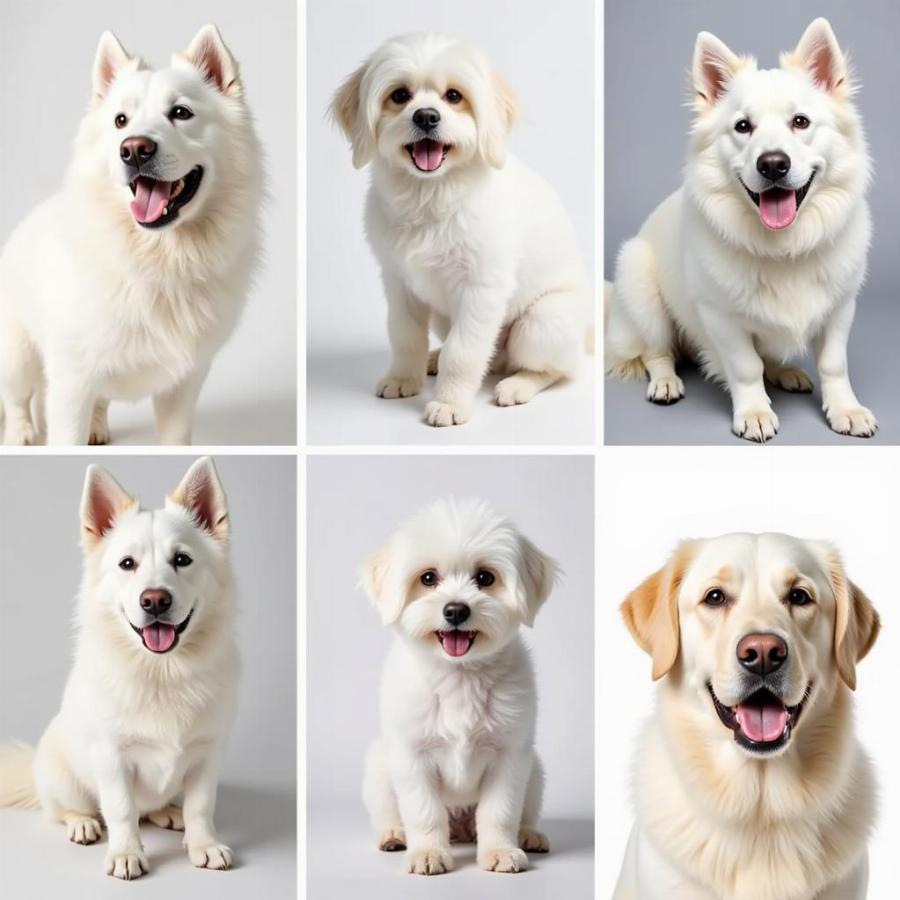White dogs possess a unique elegance and charm, captivating hearts with their pristine coats. Whether you’re drawn to their snowy fur or simply looking for a loyal companion, understanding the various white dogs breeds is crucial. From small lap dogs to large working breeds, the world of white dogs offers a diverse range of personalities and care requirements. This guide will delve into the fascinating world of white dogs breeds, offering insights into their characteristics, care needs, and what to consider before welcoming one into your home.
Unveiling the Allure of White-Coated Canines
The allure of white dogs breeds extends beyond their aesthetic appeal. Their striking coats often symbolize purity, grace, and even a touch of mystique. Many people are drawn to the idea of a white dog, picturing a fluffy cloud of fur bounding through a snowy landscape. However, the reality of owning a white dog involves more than just admiring their beauty. It’s essential to understand the specific needs and potential health concerns that can accompany certain white-coated breeds. Choosing a dog based solely on its color can lead to unforeseen challenges, so it’s vital to research different breeds and their characteristics.
 Popular White Dog Breeds
Popular White Dog Breeds
Caring for Your White Dog: Tips and Tricks
Maintaining that pristine white coat requires dedicated grooming. Regular brushing is essential to prevent matting and tangles, especially for breeds with long or double coats. Some white dogs breeds may also require more frequent bathing than others due to their propensity to attract dirt and stains. Beyond grooming, understanding breed-specific health concerns is paramount. Certain white dog breeds are predisposed to deafness, skin allergies, and eye problems.
Grooming Essentials for a Sparkling White Coat
Maintaining a white dog’s coat requires a specific grooming regimen. Regular brushing, bathing with a whitening shampoo, and even the use of tear stain removers can help keep your canine companion looking their best.
Choosing the Right White Dog Breed for Your Lifestyle
Not all white dogs are created equal. Some thrive in active households with plenty of outdoor space, while others are perfectly content cuddling on the couch. Consider your lifestyle, living situation, and experience with dogs before selecting a white dog breed. Researching breed-specific traits, such as energy levels, trainability, and grooming needs, is crucial for a harmonious relationship.
Matching Your Personality to the Perfect White Pup
Choosing a dog that complements your personality is essential for a happy and fulfilling relationship. Do you enjoy long hikes and outdoor adventures? Or are you more of a homebody who prefers quiet evenings? Matching your energy level and lifestyle to a compatible breed will ensure a smooth transition and a strong bond.
Health Considerations for White Dogs
While a white coat is undeniably beautiful, certain white dog breeds are prone to specific health issues. Deafness, particularly in breeds with blue eyes, is a concern. Skin allergies and eye problems are also more common in some white-coated dogs. Regular veterinary checkups and proactive care are essential for maintaining their well-being.
Common Health Issues in White-Coated Breeds
Understanding the potential health risks associated with certain white dogs breeds can help you make informed decisions about their care and provide preventative measures when necessary.
Conclusion: Embracing the Beauty and Responsibility of White Dogs Breeds
White dogs breeds offer a unique blend of beauty and companionship. However, responsible ownership requires understanding their specific needs and potential health concerns. By researching different white dogs breeds, you can choose a furry friend that fits seamlessly into your lifestyle and brings years of joy.
FAQ: Your Questions About White Dogs Answered
- Are all white dogs prone to deafness? No, not all white dogs are deaf. However, some white-coated breeds, especially those with blue eyes, have a higher incidence of deafness.
- What are some popular small white dog breeds? Popular small white dogs include the Bichon Frise, West Highland White Terrier, and Maltese.
- How often should I groom my white dog? The frequency of grooming depends on the breed’s coat type. Long-haired breeds may require daily brushing, while short-haired breeds may only need weekly brushing.
- Are white dogs more prone to skin allergies? Some white dog breeds are more susceptible to skin allergies, so it’s important to discuss preventative measures with your veterinarian.
- What are some large white dog breeds? Large white dogs breeds include the Great Pyrenees, Samoyed, and American Eskimo Dog.
- Are white dogs harder to keep clean? White coats can show dirt and stains more easily, so regular grooming and cleaning are necessary.
- Where can I find more information about specific white dog breeds? Reputable breed-specific rescue organizations and kennel clubs are excellent resources for detailed information.
Explore More: Related Articles on Beaut Dogs
- breeds of dogs that are white
- big white long haired dog
- black and brown and white dogs
- black and white and brown dogs
- brown white and black dog
Beaut Dogs: Your Premier Resource for Canine Companions
Beaut Dogs is your go-to source for all things canine, providing expert guidance on everything from breed selection to specialized care. We offer a wealth of information on dog breeds, health, nutrition, training, and much more. When you need expert advice, contact us at [email protected] (Email address) to have all your questions answered by Beaut Dogs. We’re dedicated to helping you provide the best possible care for your beloved furry friend. Visit us at https://beautdogs.com today!